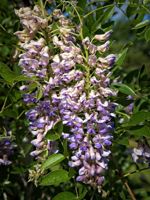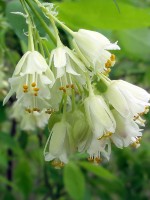Mon-Fri 9am - 5pm Mountain time
Blue Moon Wisteria vs American Bladdernut
Wisteria macrostachya Blue Moon
Staphylea trifolia
NOT AVAILABLE THIS SEASON - MIGHT RETURN
Blue Moon Wisteria is a striking, flowering vine, and the hardiest of the wisterias. Up to three times in one growing season you can expect showy, fragrant, lavender-blue flowers.
Make sure you plan your site as this vine requires a structure to support its mature weight. Try planting close to a post, trellis, or fence.
American Bladdernut is a fast-growing, ornamental shrub native to eastern North America. It can be grown as a large shrub or trained as a small tree. The small, drooping, white flowers are bell-shaped and grow in clusters. They appear in mid to late spring, attracting various pollinators. Well suited as an understory plant as it prefers shady and partial sun location with moist soils.
The blossoms mature into papery seed capsules and have been described as miniature Japanese lanterns. They are commonly used in dried flower arrangements. The seeds found within the pods are edible, and have a taste similar to pistachios. They can be eaten raw, used in baking or made into a sweet cooking oil.
Care should be taken when planting American Bladdernut, as it can spread quickly. It is prone to suckering and will self-seed. Plant the right tree in the right place.
Blue Moon Wisteria Quick Facts
American Bladdernut Quick Facts
Toxicity: can be toxic to cats, dogs, and horses when consumed

